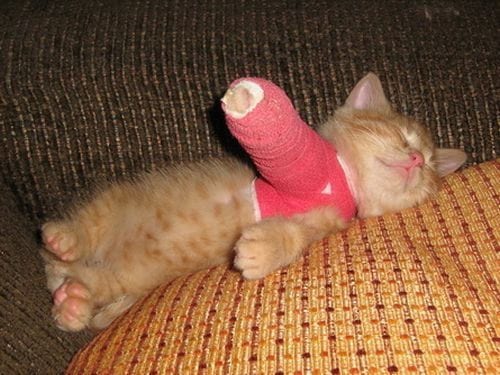It often feels as if my Bipolar Disorder is just one more relationship in my life; a being separate from myself but like a significant other who I speak to everyday. No one can make me mad or push my buttons quite the way my illness can, so she definitely feels like a spouse. However, some days I feel like she is a foreign creature, scowling at me from the corner of the room. I imagine she is a vibrant shade of blue and is threatening in the moment of a crisis, but somehow comical after the fact. Some days my eight-pound dog could easily beat her up and others she is the size of a grizzly bear. Only I think she is a cat, because no one can give you sass quite like a cat, and believe me, she has an attitude problem. Nine times out of ten she can be soothed with some high quality chocolate and solid night’s sleep, but that tenth time is usually a train wreck.
I have always believed that mental illness is the same as physical illness. A chronic condition like Bipolar Disorder is just like diabetes; a difficult component of what can be a full and happy life. Everyone with a mood disorder goes through rough or acute patches of illness from time to time. Sometimes those patches are years, sometimes just hours. I like to think of these times as a broken bone. Painful and a hindrance to everyday life, but not permanent. When we see someone struggling to get on a bus with crutches often we jump up to help. We offer support, we might even ask for the story of how the break happened. Yet we know when we see someone with a broken arm that we can offer our love without expecting the bone to heal any faster because of it. We don’t encourage our friend in a cast to snap out of his pain or ask why he can’t play baseball today. Mood disorders are much the same; accommodations from loved ones, colleagues and even strangers should be the norm but nothing except time, medicine and hard rehabilitation can bring a patient back from the pain.
The tricky part of mental illness is that most people fell off the monkey bars and broke a wrist or a collar bone when they were kids. Almost everyone has worn a cast, and even if they haven’t, they know what physical pain feels like so they can relate to the guy with crutches. Most people do not, however, know what it feels like to have a blue grizzly bear sized cat give you sass. Most people have never experienced the prolonged hopelessness and guilt that come with depression or the false confidence and intense fear of a manic episode.
This disconnect is why it is time for a call for compassion. It is time for people both with and without mental health challenges to start recognizing mental pain as just as legitimate as physical pain. Maybe people like myself need to try a little harder to explain, maybe people lacking in grizzly cats need to try a little harder to understand. Fighting stigma by reading people’s stories and sharing your own is a great place to start building that empathy, so thanks for joining the conversation.


